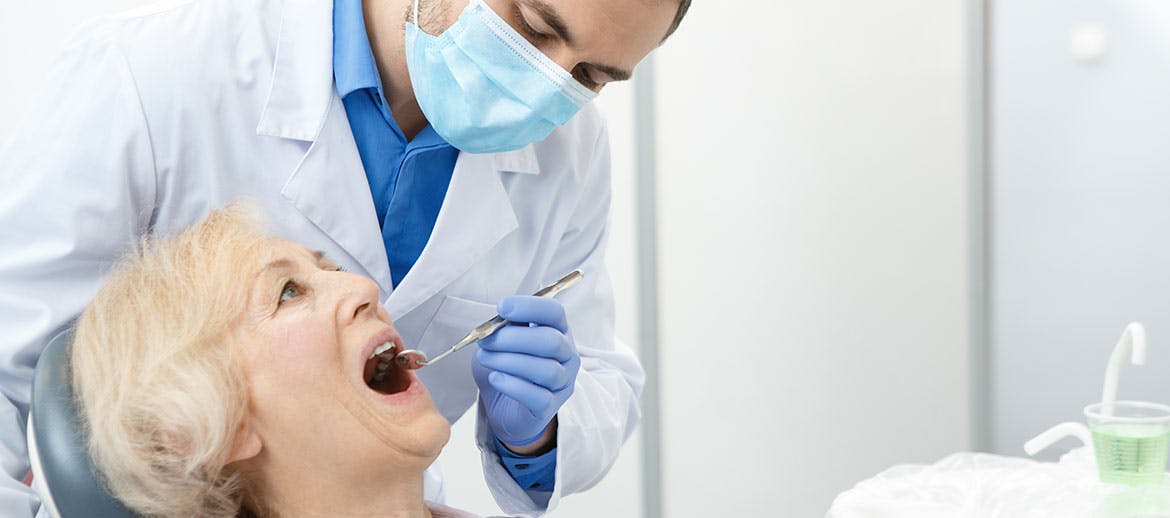7 Common Partial Dentures Problems and Solutions
Partial dentures can be a wonderful solution for replacing teeth and restoring your smile. But that doesn’t mean your experience with partials will necessarily be smooth sailing from day one. Partial dentures take some time to get used to, and you might find the first few days or weeks are an adjustment period in which you can experience a little discomfort and a fair amount of change. Fortunately, most common denture problems don’t last forever and there are solutions to help you mitigate them.
If you are preparing to get partial dentures or are currently experiencing problems with yours, take a look at these issues many partial denture-wearers face and find out what you can do to solve them.
1. Sore gums
It’s completely normal to feel some sore gums or mouth pain while getting used to your new partials.1 As you adjust to having a new appliance in your mouth, you may experience some discomfort. See a dentist if you have pain resulting from poorly fitted dentures.1 Partial dentures that are ill fitting can put too much pressure on your gums, which can lead to sores or infection.1 Adjusting the denture to fit properly could help and should only be done by a professional.
Keep in mind, it’s normal for your mouth to change. Your gum tissue and jawbones will naturally recede and shrink over time, which will affect how your partials fit.1 Over time, adjusting the denture may be necessary, and you should contact your dentist to schedule time for any adjustments and follow up appointments.1
2. Too much saliva
When you first start wearing your partial dentures, you might notice your mouth is salivating more than normal.2 This is a common partial denture problem that should resolve itself as your mouth gets used to having a foreign object in it. You can swallow more often or consider sucking on a piece of sugarless hard candy or a mint as this issue gradually goes away.
3. Unnatural feel
As previously mentioned, you and your mouth have to get used to the feeling of having something new in there. It might feel unnatural for a while, and you might feel like your lips are getting pushed out or simply have an awkward, bulky mouthfeel.1 This sensation should go away as you get accustomed to the feeling.1 Soon enough, you might not even notice your partials at all.
4. Difficulty speaking
Speaking with dentures takes practice, whether that’s by talking with your family, calling a friend on the phone or reading aloud to yourself. The more you talk, the easier it could become to pronounce tricky sounds and enunciate clearly. After a while, your tongue and mouth muscles will have adjusted, and you’ll be chatting with confidence.1
5. Trouble chewing
Eating with partials is certainly something you have to get used to,2 but by taking it slow and starting with partial denture-friendly food, you’ll get there. Start off with soft foods, such as smoothies, mashed potatoes and the like. Be sure to take small bites, chew slowly and thoroughly and sip on plenty of water.2 As your mouth muscles get used to your partials, eating will start to feel more natural and enjoyable.
6. Oral hygiene
Maintaining excellent oral hygiene is critical when you have partial dentures, as they can easily trap food, putting you at risk for gum issues or cavities in the surrounding teeth.2 Not only should you continue to brush and floss your remaining teeth daily, but you should also take steps to properly clean your partials with a partial denture cleanser. Polident ProPartial 3-Step Range includes a foam cleanser, fluoride toothpaste and mouthwash, is specially developed to cleanse partial dentures, help strengthen teeth and help protect against odor-causing bacteria.
7. Damage to the partial
As you handle your partial dentures, whether for cleaning or taking them out before bed, it’s Important to be gentle. Depending on the type of partial denture, they can be highly fragile and susceptible to bending or breaking. If your dentures are damaged, don’t try to fix them yourself as this can cause further harm. Instead, visit your dentist as soon as possible have them professionally repaired and properly fitted.
Find fixes to your partial dentures problems
As you get used to wearing partial dentures, it’s important to be aware of which problems are normal and which may require a visit to the dentist. Many of the issues you might face initially with partial dentures, like trouble pronouncing certain words or mild soreness, will resolve themselves as your mouth gets used to the partial. But prolonged or severe pain and sores or damage to your denture should be taken care of with the help of your dentist, as a poor fitting partial isn’t going to fix itself. Once your partials are fitting comfortably, you shouldn’t have too many partial denture problems to worry about. If you encounter any problems, contact your dentist immediately. It is also important that you keep up with scheduled oral care appointments.
Source Citations:
- Removable Partial Dentures. https://www.mouthhealthy.org/en/az-topics/d/dentures-partial. Accessed 12/16/21.
- Taking Care of Your Teeth and Mouth. https://www.nia.nih.gov/health/taking-care-your-teeth-and-mouth#dentures. Accessed 12/16/21.





